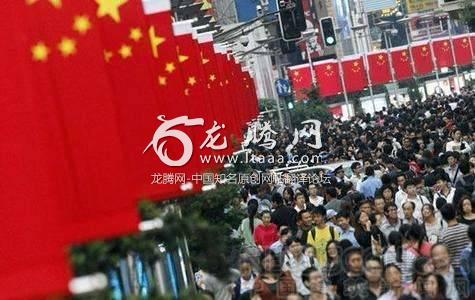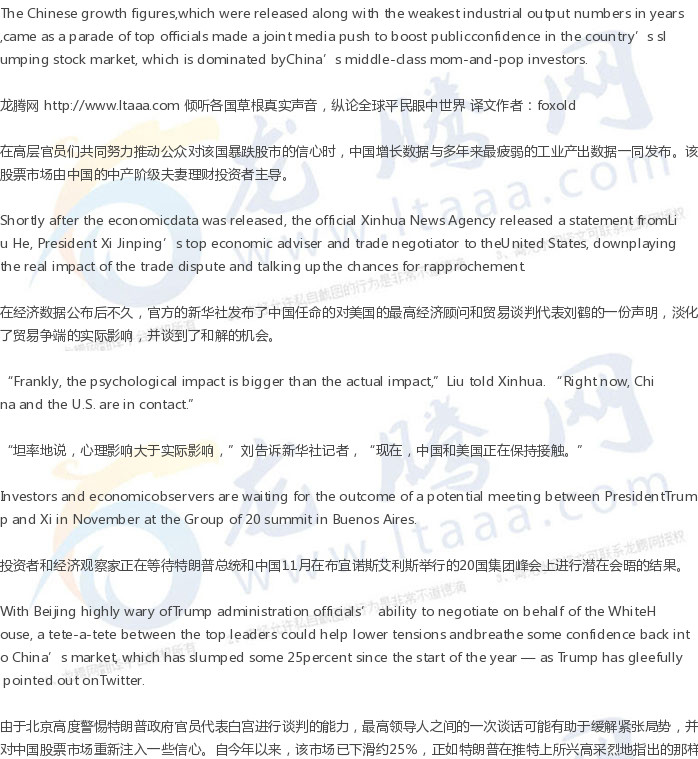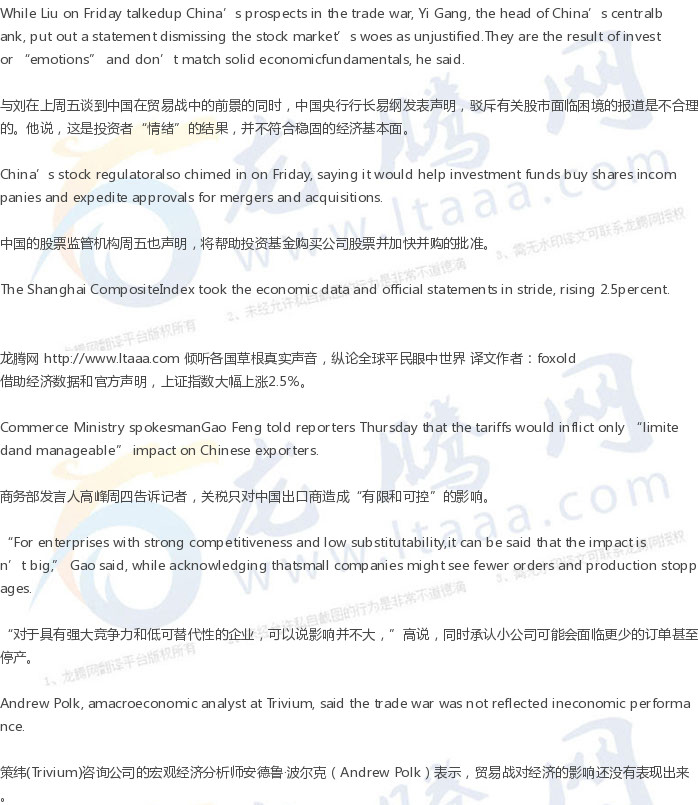中国经济增长速度降至2009年来最低 [美国媒体]
香港——根据最新发布的官方数据,中国经济正以2009年金融危机以来的最低速度增长,该数据进一步加大了与华盛顿之间有贸易争端的中国领导人面临的压力。
China’s economy grows atits slowest pace since early 2009
中国经济增长速度降至2009年来最低
HONG KONG — China’s economyis growing at the slowest pace since the depths of the financial crisis in early2009, according to newly released official data that heightens pressure on theleaders in Beijing navigating a trade dispute with Washington.
香港——根据最新发布的官方数据,中国经济正以2009年金融危机以来的最低速度增长,该数据进一步加大了与华盛顿之间有贸易争端的中国领导人面临的压力。
China’s National Bureau ofStatistics said Friday that gross domestic product rose 6.5 percent during thethird quarter compared with a year earlier, slightly below the 6.6 percentestimate by economists polled by Reuters. The sequential growth from theprevious quarter also slowed.
中国国家统计局周五表示,第三季度国内生产总值较上年同期增长6.5%,略低于路透社调查的经济学家的估值6.6%。与上一季度相比环比增长也有放缓。
Beijing has previouslysignaled that growth would naturally fall this year as it coaxes Chinesecompanies to cut down risky levels of investment and debt, but theunderwhelming GDP figure — combined with poor industrial output — may deepenanxieties given that many economists don’t think the effect of the trade warhas even shown up yet in Chinese data.
北京此前曾表示,在政府诱导中国企业降低投资和债务的风险水平的背景下,今年增长自然会下降,但GDP数据不佳以及工业产出不足可能会加剧焦虑,因为许多经济学家认为中国的数据甚至还没有计入贸易战的影响。
Numbers released Fridayshowed that industrial output growth rose 5.8 percent, lower than whateconomists expected, and home sales also lagged, according to Reuters. Retailsales, however, rose more than expected, showing that Chinese domesticconsumption, which leaders have been hoping to boost, remains strong.
周五公布的数据显示,工业产出增长5.8%,这低于经济学家的预期,据路透社报道,住房销售也降低了。但是,零售销售增长超过预期,表明中国国内消费正如领导人一直希望提振的那样,仍然强劲。
“The government is clearly getting concerned about the loss of growthmomentum, as evidenced by the recent cut in banks’ reserve requirements,” EswarPrasad, a Cornell University professor and former head of the InternationalMonetary Fund’s China division, said in an email. “The slower but still strongheadline growth masks the increasing drag from domestic financialvulnerabilities and the expanding trade war with the U.S.”
康奈尔大学教授,国际货币基金组织中国分部前负责人埃斯瓦尔普拉萨德在一封电子邮件中说:“政府显然对增长动力的丧失感到担忧,最近银行储备要求的减少证明了这一点。较慢但仍然强劲的整体增长掩盖了国内金融脆弱性和与美国日益扩大的贸易战的拖累”。
China’s central bank thismonth took a reverse step from its stated goal of tightening monetary policy bycutting banks’ reserve requirements for the fourth time this year and injectingmore cash into the economy. The stock market fell anyway amid a globalsell-off.
中国央行本月采取了与其明确的通过今年第四次削减银行存款准备金收紧货币政策的目标相反的措施,向经济注入更多现金。在全球抛售的情况下,股市无论如何都会下跌。
“China’s economic challenges are almost entirely domestic, and wehaven’t seen the trade war show up in the economic data at all,” Polk said.“But it certainly hurts the sentiment and brings about an uncertainty to thesociety.”
“中国经济面临挑战几乎完全是国内的,我们还没有看到贸易战在经济数据有所表现,”波尔克说,“但它肯定会伤害公众情绪并给社会带来不确定性。”
Chinese leaders are in adilemma about how to prop up the economy given their stated aim of loweringdangerous levels of debt. After a round of stimulus measures already, theiroptions are dwindling.
鉴于其降低危险债务水平的既定目标,中国领导人在如何支撑经济方面处于两难境地。 经过一轮刺激措施后,他们的后备措施正在逐渐减少。
“They don’t have a lot of other levers to pull,” Polk said. “They can’trely on monetary stimulus that much, otherwise it would add to the country’sdebt challenges.”
波尔克说:“他们没有很多其他措施可以动用。他们不能过多地依赖货币刺激措施,否则会增加该国的债务挑战。”
版权声明
我们致力于传递世界各地老百姓最真实、最直接、最详尽的对中国的看法
【版权与免责声明】如发现内容存在版权问题,烦请提供相关信息发邮件,
我们将及时沟通与处理。本站内容除非来源注明五毛网,否则均为网友转载,涉及言论、版权与本站无关。
本文仅代表作者观点,不代表本站立场。
本文来自网络,如有侵权及时联系本网站。
图文文章RECOMMEND
热门文章HOT NEWS
-
1
Why do most people who have a positive view of China have been to ...
- 2
- 3
- 4
- 5
- 6
- 7
- 8
- 9
- 10
推荐文章HOT NEWS
-
1
Why do most people who have a positive view of China have been to ...
- 2
- 3
- 4
- 5
- 6
- 7
- 8
- 9
- 10













